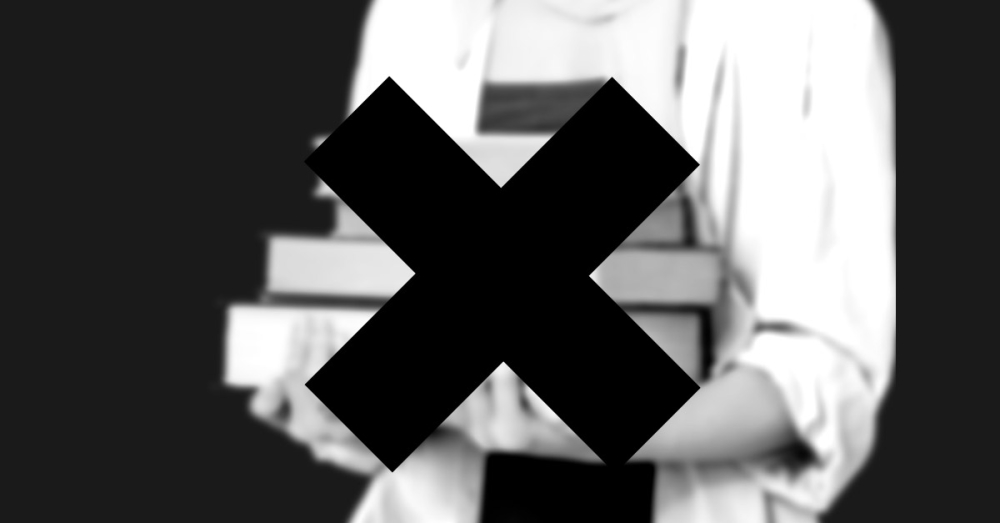So You Want to Ban a Book? Here's What Your Local Librarian Will Do

We librarians all have patrons who want specific materials removed from the shelves.
It’s difficult to predict which items will inflame sensibilities or which strike readers as incendiary. Knowing your community is part of the battle, but even being able to classify most as buttoned-up liberals, or most as religiously conservative, doesn’t proffer a fail-proof litmus test. That Harry Potter will lead to charges of paganism is a given; that a Dean Koontz-esque book may be brought to our desk and called satanic, we can less easily foresee.
Fortunately, library systems tend to have processes in place for dealing with patron challenges to their materials. Being able to gesture to a step-by-step response may even be enough to mollify some patrons, who often times just need to feel that they’ve been heard.
Patrons should be reminded, though—either when they forward the complaint, or if you contact them later to inform them of a decision—that libraries are public spaces. Collections need to be well-rounded, able to respond to the curiosities of the widest range of people possible. We make an effort to stock Dinesh D’Souza AND Bill Maher, pulp fiction AND the classics, in the hopes that all who come in looking, whether with a map or to browse, can leave with something that meets their needs. You may even gesture to a title that stands on the opposite end of the one they’re returning; show that, even if this item didn’t work for them, you have something that will.
Shelves are a forum, not a soliloquy
Perhaps better left unarticulated are the reminders that we, as librarians, give to ourselves. A challenged book may mean that we’re doing something right. Our shelves should be more like a forum than a soliloquy; they should be noisy with a variety of ideas, busy with opposing notions.
Dealing with the challenge itself may be a quick process—“someone reported a Nicholas Sparks book for a suggestive scene” may (librarians being already familiar with the challenged work) produce no lengthy review at all—or may require longer consideration. In either case, the process likely runs along a simple track:
-
The branch manager registers the complaint. You hear the patron out on what bothers them about the item in question. If they don’t offer an explicit suggestion—“this should be removed immediately!”—then try to discern what they want to happen: do they think that the material is simply not suitable for the area in which it is filed? Do they want it out entirely? Take notes, and let them know that you’re passing the material up to administration for a closer look.
-
The material is reviewed. A number of people might participate in this step, from cataloguers to administrators. The material is read (or watched, or listened to) by those who fill the role; they look for the components about which the patron complained, and gauge whether they may present an actual challenge to their current audience. Or, if you know the book already—having read The Diary of Anne Frank librarians may confidently say “this is not pornographic, and it does answer a need in our collection”—you note the challenge and re-shelve the work.
-
A judgment is made. So as not to invoke charges of censorship: this doesn’t usually, and in my opinion should not usually, involve removing material from the shelf. Often, relocation is the solution. You move Judy Blume’s Are You There, God? It’s Me, Margaret up to young adult or adult; educational books on the body’s processes, or adolescence, get bumped up to adult non-fiction, so that concerned parents can exercise more control in the selection process. Such decisions may appear arbitrary from the outside, but they offer parents and readers the comfort of clear delineations. If your community is not generally comfortable with preteens reading novels that allude to sex or drugs, you take the books alluding to sex and drugs and file them alongside Hemingway and Weiner. Readers may then go into the stacks feeling confident about what they may encounter. Feeling safe may be as important to those lodging the complaints as actually being wholly cut off from the challenged material.
A Library’s Highest Duty
This said, I’m offering shortcuts to a process that is often very emotional and tenuous, for librarians and patrons alike. A patron may simply want to be heard; but their insistence that the book should be removed, destroyed, or burned may also be wholly in earnest, and they may not ultimately respect the system’s decision.
Offer yourself a stern reminder that you’ll garner the greatest public sympathy if you’re not stripping challenged material away from the community. Local churches may not like 50 Shades of Grey; Americans at large will defend access to it. And should. Preserving access is one of a library’s highest public duties.
And if you ever feel alone, or at a loss, at any step during the process, you can turn to ALA guidelines, and lists of frequently challenged books to get a sense of how similar complaints are dealt with, or how common they are, in libraries across the country.

Michelle Schingler is a librarian in Hall County, Georgia and a freelance writer for Foreword Reviews. You can follow her on Twitter @mschingler
Michelle Anne Schingler
